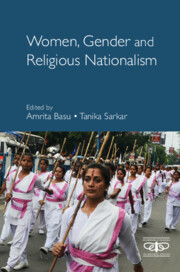Book contents
- Frontmatter
- Dedication
- Contents
- List of Abbreviations
- Introduction: Women of Hindu Rashtra
- Part I Changing Modalities of Hindu Nationalist Organizing
- Part II Gendered Techniques of Mobilization: The Sangh and the Samiti
- Part III Cultivating Women’s Militancy: The Vishva Hindu Parishad
- Part IV Refashioning Gender and Sexuality
- Part V Alternative Activist Responses to the Hindu Right
- Glossary
- About the Contributors
- Index
6 - Conflicting Modes of Agency and Activism: Conversations with Hindutva Women
Published online by Cambridge University Press: 12 August 2022
- Frontmatter
- Dedication
- Contents
- List of Abbreviations
- Introduction: Women of Hindu Rashtra
- Part I Changing Modalities of Hindu Nationalist Organizing
- Part II Gendered Techniques of Mobilization: The Sangh and the Samiti
- Part III Cultivating Women’s Militancy: The Vishva Hindu Parishad
- Part IV Refashioning Gender and Sexuality
- Part V Alternative Activist Responses to the Hindu Right
- Glossary
- About the Contributors
- Index
Summary
In this chapter, I set out to explore certain contradictory facets of women's involvement and militancy within Hindutva. The inquiry is rooted in the city of Bhopal, presenting two case studies of women functionaries who are a part of the Hindutva sangathan (Hindu right organizational formation). A burgeoning city in central India and the capital of Madhya Pradesh, Bhopal is a major politico-cultural node of the region. It has a thriving Hindutva network, with various interlocked outfits at the ground level.
In Bhopal, Hindutva's ideological sway has been felt in a variety of ways, not just in regular electoral competition. One of the most disquieting links in this long and winding chain of events was the riot that tore through the city in December 1992, in the immediate aftermath of the demolition of the Babri Masjid, situated in the north Indian state of Uttar Pradesh. The Bhopal riot lasted for over a week and inflicted grave losses. Official sources estimated around 140 deaths, while unofficial accounts regarded the number to be much higher – at about 250 (Basu 1994: 12). Muslim residents, in particular, were hit hard, as they were largely at the receiving end of targeted attacks, led by militant Hindutva organizations and local police, often found to be acting in collaboration. The riot gave rise to hitherto unknown anxieties and vulnerabilities. In its wake, the stiffening of attitudes and hardening of socio-spatial boundaries have been keenly felt. Ironically, a city that had remained remarkably quiet for the most part in 1947 during the Partition tumult, flared up in 1992. Since then, Bhopal has come to be ‘classified as a hyper-sensitive city as far as communal disturbances are concerned’ (Dubey 2003: 3).
Hindutva had the most to gain from such post-riot communalization. It capitalized on growing polarization to further consolidate its influence and reap rich returns (Jaffrelot 1996). In repeated contests for power, the Sangh Parivar's political wing, the Bharatiya Janata Party (BJP), steadily improved its standing in the city. In the 2018 State Assembly elections, it gained four out of seven seats in Bhopal. Its performance had been even better in 2013, when it captured six out of seven assembly segments there. Since 1989, the Bhopal parliamentary seat has rested securely with the BJP.
- Type
- Chapter
- Information
- Women, Gender and Religious Nationalism , pp. 169 - 192Publisher: Cambridge University PressPrint publication year: 2022
- 1
- Cited by



